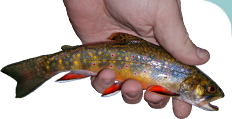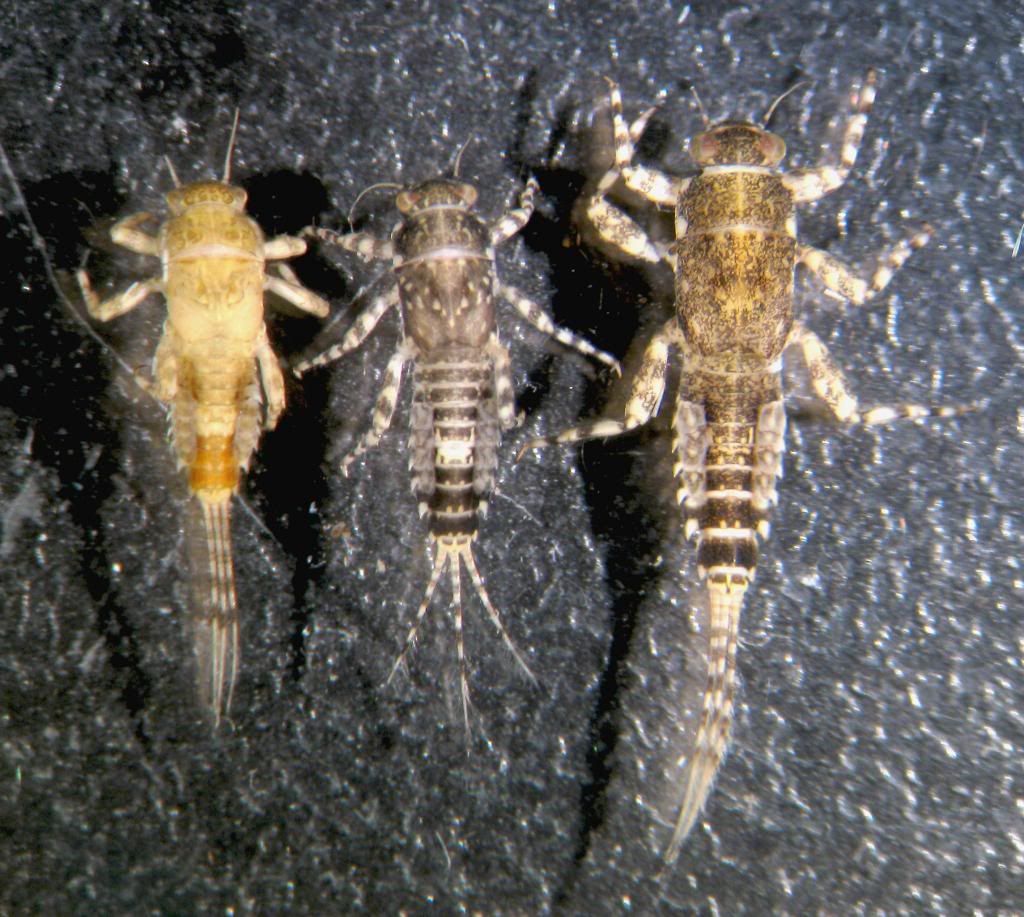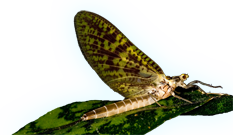Blog & Latest Updates
Fly Fishing Articles
Insects by Common Name


> > Three Ephemerellids
| Crepuscular | March 13th, 2013, 2:41 pm | |
| Boiling Springs, PA Posts: 923 | All three of these Ephemerella nymphs were collected from the same rock on the same day (3/11/2013) I have not had time to take them through the key yet, any speculations? | |
| Lastchance | March 13th, 2013, 3:41 pm | |
| Portage, PA Posts: 437 | No. | |
| Taxon | March 13th, 2013, 7:14 pm | |
Site Editor Royse City, TXPosts: 1350 | Hi Eric- I believe these Ephemerellid nymphs to all be Ephemerella invaria. | |
| Best regards, Roger Rohrbeck www.FlyfishingEntomology.com | ||
| Martinlf | March 13th, 2013, 7:45 pm | |
Moderator Palmyra PAPosts: 3233 | Interesting differences in color. Has the one on the left perhaps recently molted? | |
| "He spread them a yard and a half. 'And every one that got away is this big.'" --Fred Chappell | ||
| Entoman | March 13th, 2013, 7:47 pm | |
| Northern CA & ID Posts: 2604 | Yes, I think so. | |
| "It's not that I find fishing so important, it's just that I find all other endeavors of Man equally unimportant... And not nearly as much fun!" Robert Traver, Anatomy of a Fisherman | ||
| Gutcutter | March 13th, 2013, 8:22 pm | |
| Pennsylvania Posts: 470 | How fast can they go through an instar? Three nymphs of the same species (I am assuming Roger is correct) which has a "normal" hatch duration in the streams I frequent of about a month. As much as he is out and about, I'd bet that Eric can nail the length of the invaria hatch on the given stream pretty accurately. Can the smallest of the bunch obtain the size of the biggest in a month? | |
| All men who fish may in turn be divided into two parts: those who fish for trout and those who don't. Trout fishermen are a race apart: they are a dedicated crew- indolent, improvident, and quietly mad. -Robert Traver, Trout Madness | ||
| Entoman | March 13th, 2013, 8:46 pm | |
| Northern CA & ID Posts: 2604 | Can the smallest of the bunch obtain the size of the biggest in a month? Yes, but also keep in mind the disparity in size between the sexes. A late hatching male will be substantially smaller than an early cycle female this time of year. Some of the heptageniids that trickle off all Summer show up in my samples with the same wide cross section of sizes seemingly all season. How fast can they go through an instar? Development is dependent on water temps and for those species that don't overwinter in the egg state, takes place the fastest after ecclosion, slows during the winter and then picks up in the Spring prior to hatching. It is my understanding that in optimal conditions they can go though instars on a weekly basis or even faster with some species. | |
| "It's not that I find fishing so important, it's just that I find all other endeavors of Man equally unimportant... And not nearly as much fun!" Robert Traver, Anatomy of a Fisherman | ||
| Taxon | March 13th, 2013, 8:51 pm | |
Site Editor Royse City, TXPosts: 1350 | Hi Tony- Mayflies undergo (15-25) growth instars during their nymphal lifestage. So, if you divide 25 into the (approximately 325-350) days a uni-voltine mayfly spends in the lifestage, the answer to your question would be (approximately 13-14) days. However, another factor which may also be at play here is gender, as female mayflies are generally somewhat longer than their male counterpart. | |
| Best regards, Roger Rohrbeck www.FlyfishingEntomology.com | ||
| Entoman | March 13th, 2013, 9:01 pm | |
| Northern CA & ID Posts: 2604 | Taxon, What do you make of the shorter tails held differently on the middle specimen? Male characters? | |
| "It's not that I find fishing so important, it's just that I find all other endeavors of Man equally unimportant... And not nearly as much fun!" Robert Traver, Anatomy of a Fisherman | ||
| Taxon | March 14th, 2013, 3:27 am | |
Site Editor Royse City, TXPosts: 1350 | Hi Kurt- It appears to me that the middle tail is longer than the others. I suspect all three are broken off, but the middle one less than the other two. | |
| Best regards, Roger Rohrbeck www.FlyfishingEntomology.com | ||
| Crepuscular | March 14th, 2013, 11:05 am | |
| Boiling Springs, PA Posts: 923 | Roger I believe you are correct the only one that was a little curious was the lighter colored one on the left. That one had posterolateral projections on 3-9 and tubercles on 2-8 that were shaped differently than the other two (sharper)but to be needhami the tubercles would have to be on 1-8. If I were younger I'd have a new drinking game, you read Jacobus and McCafferty 2003 aloud and every time any form of the word variable is spoken you do a shot... ;) | |
| Falsifly | March 14th, 2013, 11:46 am | |
| Hayward, WI. Posts: 661 | If I were younger I'd have a new drinking game, you read Jacobus and McCafferty 2003 aloud and every time any form of the word variable is spoken you do a shot... ;) What does age have to do with it? | |
| Falsifly When asked what I just caught that monster on I showed him. He put on his magnifiers and said, "I can't believe they can see that." | ||
| Entoman | March 14th, 2013, 2:10 pm | |
| Northern CA & ID Posts: 2604 | I believe you are correct the only one that was a little curious was the lighter colored one on the left. That one had posterolateral projections on 3-9 and tubercles on 2-8 that were shaped differently than the other two (sharper) Yes, I suppose that could be just an intraspecific variability, gender difference, or even due to immaturity. If I were younger I'd have a new drinking game, you read Jacobus and McCafferty 2003 aloud and every time any form of the word variable is spoken you do a shot... ;) Ha! Even a pro drinker wouldn't last long at that game! LOL | |
| "It's not that I find fishing so important, it's just that I find all other endeavors of Man equally unimportant... And not nearly as much fun!" Robert Traver, Anatomy of a Fisherman | ||
| Oldredbarn | March 14th, 2013, 6:23 pm | |
| Novi, MI Posts: 2608 | Eric is a funny, funny, man, but I think that what Tony and Roger are getting at is pretty damn interesting...Think cows in a pasture, or caterpillar chewing up the forest...The caddis larve and mayfly nymphs are there just to eat to store up enough energy to get the reproductive job done.If there is food present they eat...Non-stop. But...If someone is fishing, say at the end of March, or the beginning of April and he was using Hendrickson nymphs...They would need to be a hook size or two smaller than we imagine the Henny nymph to be...If growth is that fast near the end of the nymphal stage...The ones that most folks tie, in 14's or 12's, would only be correct nearer to hatch time. I think this is good info to have.A hatch matcher who is aware of the coming attractions for the weeks following his visit would/should carry smaller nymph versions to fish of the bugs that are going to hatch somewhere down the line... If E subvaria finds itself in the drift from time-to-time as it develops...Maybe a size 16 fished a month or so prior to hatch time would be in order. Spence | |
| "Even when my best efforts fail it's a satisfying challenge, and that, after all, is the essence of fly fishing." -Chauncy Lively "Envy not the man who lives beside the river, but the man the river flows through." Joseph T Heywood | ||
| Crepuscular | March 14th, 2013, 7:10 pm | |
| Boiling Springs, PA Posts: 923 | Spence, what you say makes sense, and would be somewhat practical, but when are mayfly nymphs most available to trout, when they are moving about correct? Well they move about mostly during a relatively short period just before hatching, making several "test runs" to the surface (especially the ephemerellids). If you are going to fish a Hendrickson nymph or some other pattern that is imitating a specific mayfly I go the easy route and use the size of the mature nymph, just because that's probably what's available to the trout. So while having several sizes of, say Hendrickson nymphs in your box, may fit the bill sometimes, I would suggest that maybe this is where those general imitator nymphs come into play. That's why we have (or at least I do) pheasant tails from size 22 to 12. The same goes for hare's ear in a dark, medium and light shade of brown and a couple shades of olive in a variety of sizes. Plus while we are waiting for the Hendricksons to start we can fish grannom dries anyway... | |
| Entoman | March 14th, 2013, 7:12 pm | |
| Northern CA & ID Posts: 2604 | I suspect all three are broken off I agree. The posture is still different from the other two, though that could just be coincidence I suppose. Notice how the tails taper much more quickly from thick to thin than with the other two specimens? I don't know what that means either (if anything), but it's interesting... | |
| "It's not that I find fishing so important, it's just that I find all other endeavors of Man equally unimportant... And not nearly as much fun!" Robert Traver, Anatomy of a Fisherman | ||
Quick Reply
You have to be logged in to post on the forum. It's this easy:
Related Discussions
| Title | Replies | Last Reply |
| Re: stupid question In Male Baetis bicaudatus Mayfly Nymph by Brian314 | 2 | Feb 27, 2022 by Brian314 |
| Re: What size are damselflies? In Argia Damselfly Nymph by Adirman | 1 | Jun 28, 2012 by Entoman |
| Re: Stupid damselfly! In the Insect Order Odonata-Zygoptera by Troutnut | 4 | Jul 1, 2007 by Litobrancha |
| Re: Latin Help In General Discussion by Shawnny3 | 4 | Jul 20, 2006 by Shawnny3 |
| Re: Borcher's Drake In Female Leptophlebia Mayfly Dun by Oldredbarn | 3 | May 13, 2010 by TNEAL |
| Re: lateseason mayfly In the Identify This! Board by Lifeaquatic | 2 | Dec 11, 2007 by Lifeaquatic |
| Re: Spatsizi In General Discussion by Spatsizi | 1 | Sep 15, 2006 by Troutnut |
| Re: I'm back In General Discussion by Wbranch | 6 | Apr 2, 2022 by Oldredbarn |
| Re: Stonefly confusion In General Discussion by Feathers5 | 2 | Mar 8, 2017 by Crepuscular |
| Re: Site updates from July 9, 2011 In Site Updates by Bnewell | 1 | Jul 13, 2011 by Waxsmith |
Troutnut.com is copyright © 2004-2024 Jason
Neuswanger (email Jason). See my FAQ for information about use of my images.
 privacy policy
privacy policy







